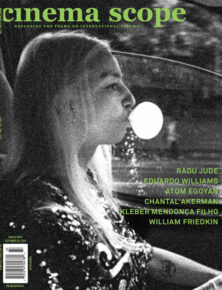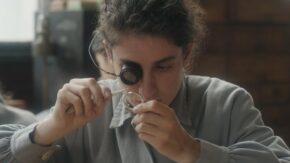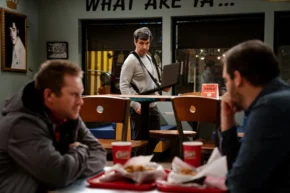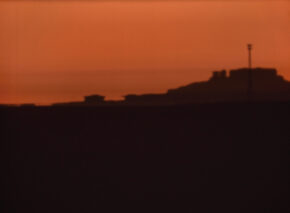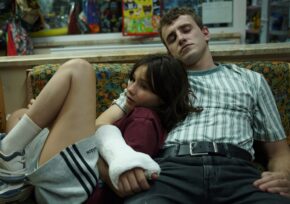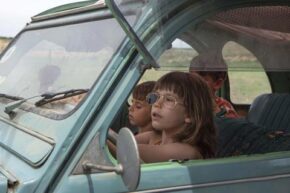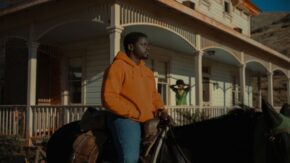Cinema Scope Magazine
Cinema Scope Table of Contents 96
By cscope2 | 10/04/2023 | CS96, From Cinema Scope Magazine
Interviews Workingman’s Death: Radu Jude on Do Not Expect Too Much from the End of the World by Jordan Cronk Outside In: Eduardo Williams on The Human Surge 3 by Blake Williams The Phantom of the Opera: Atom Egoyan on Seven Veils by Adam Nayman Afterlife: Kleber Mendonça Filho on Pictures of Ghosts by Tom…
Read More → Timely Circumstances: Cyril Schäublin on “Unrest”
By Jay Kuehner | 09/27/2022 | CS92, From Cinema Scope Magazine, Interviews
I think this is the critical question now: how do we chart our history? How do we reimagine a truer solidarity? Maybe the film allows us to imagine other possibilities.
Read More → TV or Not TV | Finding Fielder: “The Rehearsal”
By Kate Rennebohm | 09/26/2022 | Columns, CS92, From Cinema Scope Magazine, TV, TV or not TV
Nathan Fielder’s newest television show, The Rehearsal—which was renewed for a second season at the recent close of its dizzying six-episode run on HBO—is a true comedy, in the sense that it’s really a tragedy. A deeply funny show wrapped around a startling core of sadness, The Rehearsal sets its sights on the tangled notion that the more we instrumentalize or attempt to control the world, the more the reality of that world and those in it seems to escape us.
Read More → Film/Art | Evidence Visible from a Distance: Tacita Dean on Fata Morgana
By Antoine Thirion | 09/26/2022 | Books, Columns, CS92, Film - Art, Interviews
In The Green Ray (2001), British artist Tacita Dean famously managed to capture on 16mm film the fleeting light that the sun leaves behind right at the moment when it disappears from the horizon. And, because a digital camera used by others at the same time, on the same beach, was unable to capture it, her film proves two things: one, that the green ray, despite being missed by almost all who try and see it, is not a legend; two, that only film can capture it. But the evidence is elusive, as Éric Rohmer found out while shooting Le rayon vert (1986), eventual
Read More → Aftersun (Charlotte Wells, UK/US)
By Jason Anderson | 09/26/2022 | CS92, Currency, From Cinema Scope Magazine
The image of Paul Mescal lost and losing himself in a crowded, strobe-lit dancefloor is the most haunting leitmotif in Charlotte Wells’ debut feature Aftersun, a film that would be acutely musical in feel and structure even if it weren’t powered by such a carefully curated selection of underappreciated late-’90s UK chart faves (All Saints and Chumbawamba included). As glimpsed in the flickering light, his face expresses both the loved-up chemical bliss expected of the era’s aging ravers and a more disquieting sense of vacancy; it’s as if he’s not all there. And while that phrase risks being more suggestive of some garden-variety weekender blasted
Read More → Alcarràs (Carla Simón, Spain/Italy)
By Saffron Maeve | 09/26/2022 | CS92, Currency, From Cinema Scope Magazine
By Saffron Maeve A pejorative superficially on par with its sister terms Big Pharma and Big Tech, which imply a gadgety reshaping of the natural world, Big Ag looms heavy over the sunny fields of Carla Simón’s acclaimed Alcarràs, which was awarded the Golden Bear at this year’s Berlinale and exceeded all box-office expectations upon…
Read More → Nope (Jordan Peele, US)
By Robert Koehler | 09/26/2022 | CS92, Currency, From Cinema Scope Magazine
Whatever else you may have heard about Nope, otherwise known as “Not of Planet Earth,” know this: Jordan Peele’s third and most radical movie is his subversive inquiry into Hollywood. On the surface, such a stance is old news. At least as early as Nathaniel West’s The Day of the Locust, artists who have experienced the Hollywood moviemaking business firsthand have exacted some form of literary or cinematic revenge at the beast that has fed them. The irony is that it can sometimes seem that it’s some of the most successful in the Hollywood galaxy who engage in this project, whether it be Vincente Minnelli with The Bad and the Beautiful (1952), Paul Mazursky with Alex in Wonderland (1970), or Robert Altman with The Player (1992).
Read More → 
